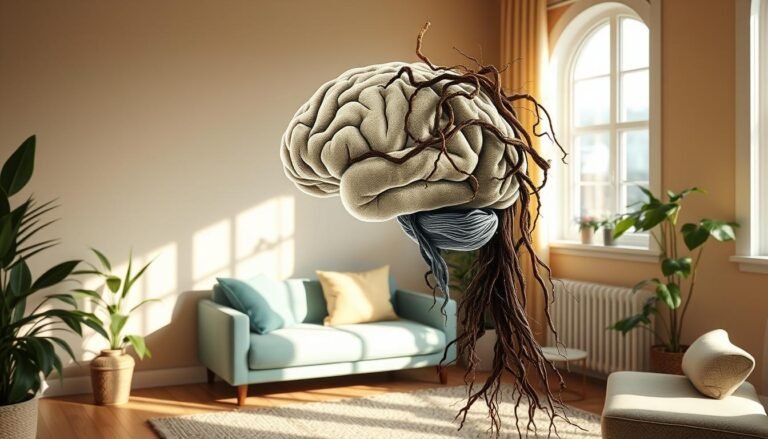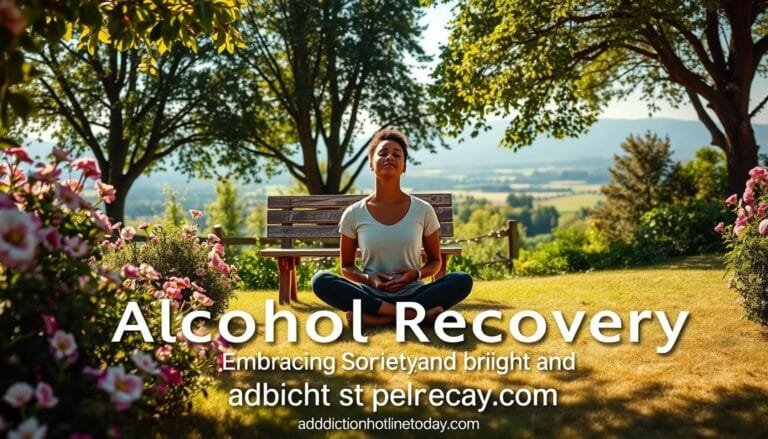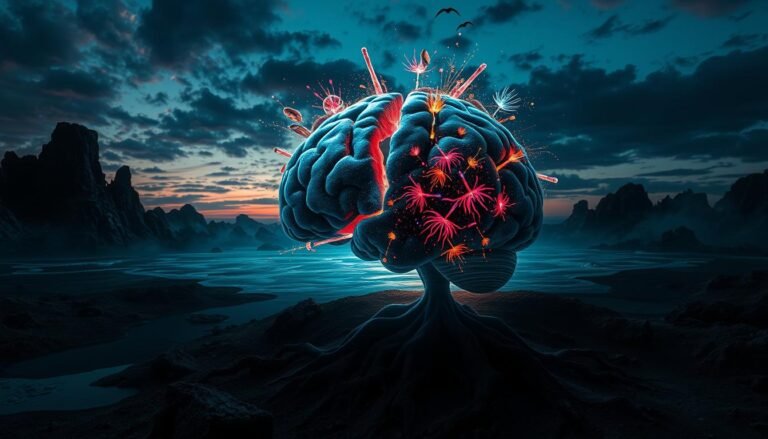Find Hope Through Expert Addiction Counseling Services
Feeling overwhelmed by addiction? You’re not alone. Millions struggle with substance use and mental health issues every day. But, there’s a way out. Expert addiction counseling services offer hope, guiding you and your family towards recovery and a new purpose.
Our mission is built on understanding addiction’s complexity. It’s a chronic condition needing care that’s both compassionate and evidence-based. Our team of addiction counselors, therapists, and recovery coaches is here to help. We give you the tools and support to take back your life from addiction.
Key Takeaways
- Comprehensive outpatient addiction treatment programs available, including day treatment, intensive outpatient (IOP), and virtual services
- Certified addiction counseling services to address substance use, mental health, and co-occurring disorders
- Personalized treatment plans tailored to individual needs and recovery goals
- Integrated therapies and medication management for holistic healing
- Family support and counseling to foster lasting change
Understanding the Nature of Addiction and Recovery
Addiction is a complex issue that affects millions globally. It’s seen as a chronic disease, caused by brain circuits, genetics, and life experiences. It leads to strong cravings for substances or behaviors that affect the brain’s reward system.
The Science Behind Addiction as a Chronic Disease
Genetics play a big role in who might become addicted. Environmental factors like childhood trauma and peer pressure also matter. Drugs and alcohol hijack the brain’s reward system, using dopamine to make addiction feel good.
Recognizing Signs and Symptoms
Addiction starts with trying something new and can turn into compulsive behavior. It can hurt relationships, work, and health. Without help, it can damage self-esteem and mental health.
The Impact on Mental and Physical Health
Substance abuse can make mental health issues worse. It can change the brain and increase the risk of mental health problems. Physical damage from addiction can be severe, even life-threatening.
Recovery from addiction is possible with the right help. This includes behavioral therapy, medication, and support. Getting help from addiction professionals at addictionhotlinetoday.com is a key step towards recovery.
“Addiction is a chronic, relapsing disorder characterized by compulsive drug seeking and use, despite harmful consequences. It is considered a brain disease because drugs change the brain’s structure and how it functions.”
The Transformative Power of Addiction Counseling
Addiction counseling is a game-changer for those struggling with addiction. It offers a safe space to explore feelings and understand why they abuse substances. It also teaches coping skills and helps build emotional strength.
Evidence-based treatment uses science and personal preferences to help. It’s designed to meet each person’s unique needs. This approach builds trust in proven therapies.
Cognitive-Behavioral Therapy (CBT) is a key method. It helps change negative thought patterns and behaviors. Dialectical Behavior Therapy (DBT) also helps manage strong emotions and build resilience.
Addiction counseling can change lives. It helps people understand their addiction and find ways to stay sober. Skilled counselors provide the support needed for lasting recovery.
If you or a loved one needs help, habitrecovery.com is here. They offer personalized therapy and group support. Their team helps you on the journey to sober living and family counseling.
Comprehensive Treatment Approaches in Modern Recovery
Modern addiction recovery uses many new methods. These include evidence-based therapies, mental health services, and personalized medicine. These strategies help tackle addiction’s many sides, using the latest science and holistic ideas.
Evidence-Based Therapeutic Methods
Today’s addiction treatments use evidence-based therapies that really work. Cognitive Behavioral Therapy (CBT) helps change bad thought patterns and behaviors. Motivational Interviewing (MI) boosts the desire to get better.
Mindfulness-based therapies, like Mindfulness-Based Stress Reduction (MBSR), are also popular. They help reduce cravings, improve emotional control, and increase self-awareness.
Integrated Mental Health Services
Modern recovery programs focus on integrated mental health services. They treat both addiction and mental health issues like depression and anxiety. A team of experts works together to provide complete care.
Medication Management Options
In some cases, medication-assisted treatment is key. Medicines like buprenorphine and naltrexone help manage withdrawal and cravings. They work best with therapy and lifestyle changes.
By using a wide range of treatments, programs like rehabme.org help people beat addiction. They start a journey towards healing and lasting change.
Outpatient Treatment Programs and Their Benefits
Outpatient addiction treatment programs are flexible and easy to access. They include intensive outpatient programs (IOPs) with a structured plan. This plan includes group therapy, individual counseling, educational sessions, and support groups.
These services let people keep up with their daily life while getting help. They are great for those with less severe addictions or as a step-down from inpatient treatment.
One big plus of outpatient treatment is how flexible it is. People can fit their therapy sessions into their busy schedules. This makes it easier to keep up with work, school, or other commitments.
This flexibility helps people stay on track with their recovery. It boosts the chances of a successful outcome.
| Outpatient Treatment | Inpatient Treatment |
|---|---|
| Cost-effective, ranging from $2,000 to $5,500 for 1-3 months | More intensive and more expensive, with 24/7 medical care |
| Allows individuals to live at home while receiving therapy | Requires patients to reside at a treatment facility for the duration of the program |
| Offers a range of therapeutic interventions and services in different settings | Provides a structured, immersive environment focused on recovery |
| Caters to individuals’ needs based on the severity of their substance use disorder | Typically recommended for severe addictions or complex medical conditions |
Outpatient programs use many evidence-based therapies. These include cognitive-behavioral therapy, contingency management, and motivational enhancement therapy. These therapies help people develop coping strategies and address underlying issues.
For those in the early stages of addiction or committed to recovery, outpatient treatment is very helpful. It offers flexible scheduling and personalized care. This lets people take an active role in their healing while keeping up with their daily life.

Virtual Treatment Solutions in Contemporary Recovery
In today’s world, virtual solutions are changing how we fight addiction. With telehealth technology, people can get individual therapy, group therapy, and addiction treatment from home. This makes getting help easier and more flexible.
Telehealth Advantages for Accessibility
Telehealth has changed how we get help for addiction. It makes going to therapy easier by removing the need for travel. This means more people can get the help they need without facing big challenges.
Virtual intensive outpatient programs (IOPs) offer a full recovery plan. They use the latest research and therapies. This helps people stay on track with their recovery goals.
Online Support Group Dynamics
Online support groups have also changed how we connect during recovery. They let people share their stories and get advice from others. This creates a community where everyone can feel supported.
These groups are a safe place for people to talk about their struggles. They work well with individual therapy and group therapy to help people overcome addiction.
| Virtual Treatment Modalities | Benefits |
|---|---|
| Telehealth Addiction Counseling | Improved accessibility, reduced barriers to care, and enhanced attendance rates |
| Virtual Intensive Outpatient Programs (IOPs) | Comprehensive approach to recovery, incorporating evidence-based therapies and peer support |
| Online Support Groups | Fostering a sense of community, providing a safe and confidential space for individuals in recovery |
Virtual treatment has changed how we get help for addiction. It makes getting help easier and more flexible. With technology, more people can get the help they need to stay sober and healthy.
Family Support and Healing in Recovery
Addiction affects not just the person struggling but their whole family. Counseling and support services help everyone heal and grow. They focus on the family’s role in recovery.
Family counseling and support groups offer a safe space for families to deal with addiction. They help improve communication and understanding of recovery. Together, families can rebuild trust and support their loved one’s sobriety.
- More than one in 10 children under the age of 18 live with at least one adult who has a substance use disorder (SUD).
- 7.5 million children aged 17 or younger live with a parent who has an alcohol use disorder (AUD).
- Parental substance abuse was the cause behind 38.9% of the cases of children who were removed from their homes in 2019.
Therapies like behavioral couples therapy (BCT) and brief strategic family therapy (BSFT) help families. They improve communication and reduce relapse risk. These methods help families work together towards sobriety and healing.

Support groups and peer-led services also help families. They connect families with others facing similar challenges. These groups offer education, strategies, and a place to share experiences.
Recovery is a journey of healing together. Family support is key to success. It brings hope and a path to wellness for all involved.
Specialized Addiction Counseling Services
Addiction is a complex issue that needs personalized care. Specialized counseling services meet the unique needs of those seeking recovery. They tailor treatment to fit each person’s situation and preferences, making recovery more effective.
Individual Therapy Sessions
Individual therapy with experienced counselors offers personal support and strategies for beating addiction. In these sessions, clients can talk about their addiction’s roots, learn coping skills, and set recovery goals. This approach creates treatment plans that meet each client’s specific needs.
Group Counseling Benefits
Group counseling is a key part of addiction treatment. It lets people share their stories, get support from others, and learn from their peers. This community and shared understanding help in lasting change and building a strong support network.
LGBTQIA+ Focused Programming
Specialized counseling services include LGBTQIA+ focused programs. These programs address the unique challenges this community faces. They offer a safe, inclusive space for targeted support and resources, helping in successful recovery.
“Addiction is one of the most common behavioral health conditions impacting millions of Americans every day. Specialized addiction counseling services ensure that treatment is tailored to individual needs and circumstances, providing a more effective approach to recovery.”
Dual Diagnosis Treatment and Mental Health Integration
Addiction and mental health disorders often go together, known as a “dual diagnosis.” About 21.5 million adults in the United States have a co-occurring disorder, says the latest SAMHSA survey. People struggling with addiction are more likely to develop mental health issues. Those with mental health problems might use drugs and alcohol to cope.
Good dual diagnosis treatment tackles both addiction and mental health at the same time. It’s done by experts who focus on the whole person. This includes mental health checks, therapy, and managing medications. Treating both issues together helps people recover better.
Integrated treatment programs let people get help for both addiction and mental health in one place. This saves time and effort. Each person’s needs are different, so treatment plans must be tailored. Support groups and access to mental health services are also key.
Finding a rehab with experience in dual diagnosis is vital. Look for staff trained in both areas, special programs, and a full approach to addiction rehabilitation and mental health support.
Building a Strong Recovery Support Network
Creating a strong support network is key for lasting recovery from addiction. This network can include local health centers, AA meetings, and national helplines like SAMHSA. These resources offer encouragement, accountability, and access to important resources to keep sobriety.
Having a network of peers, counselors, and family members is vital for recovery. Studies show that strong relationships lead to more happiness and better health. In fact, connected adults live up to seven years longer than those who are not.
Addiction treatment programs help build strong support systems. They connect people with peers and professionals who offer guidance and support. Programs offer many care options, like support groups and sober living homes, to help build a strong network for recovery.






